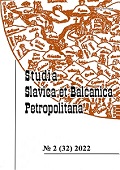Древнерусская Ладога в контексте Варяжской легенды: Ревизия источников и интерпретаций
Old Russian Ladoga in the context of the Varangian legend: Revision of sources and interpretations
Author(s): Nadezhda Igorevna PlatonovaSubject(s): Archaeology, Cultural history, Customs / Folklore, Oral history, Cultural Anthropology / Ethnology, 6th to 12th Centuries, 13th to 14th Centuries
Published by: Издательство Исторического факультета СПбГУ
Keywords: early medieval Ladoga; Varangian legend; oral tradition; Primary Chronicle; written and archaeological sources;
Summary/Abstract: The Chronicles contain limited information about Ladoga in the 9th – 10th centuries. Epic and toponymic legends are visible in these news. The first news is found under the year 862 in the copies of the «Povest’ vremennykh let» of the Ipatiev tradition. It belongs to the text of the Varangian legend from the «Ladoga» version. The second news about Ladoga is discovered in 922. This year, the First Novgorod Chronicle reports the death of Prince Oleg the Prophet and his grave, preserved in Ladoga. The political relevance of both news in the historical context of the 11th – early 12th centuries can be clearly seen. An article by N. I. Platonova deals with the problems of sources, meanings, genre and chronology of various versions of the Varangian legend in the Primary Chronicle. The types of oral sources, which became the basis of the earliest texts, and the cultural mechanisms for the preservation and transmission of information about the past in the Old Russian society are briefly characterized. The author supports the N. Lopatin’s hypothesis about the emergence of the «Novgorod» version in the early 11th century and its historical context. Particular attention is paid to the chronology of the «Ladoga» version and the political situation that gave rise to it, as well as the problem of the existence of a princely residence in Ladoga in the 9th – 10th centuries. The article demonstrates that both the original and editorial versions of the Varangian legend are, first of all, sources for studying the history of the period when they were created. It is impossible to consider any of them — as a direct reflection of the 9th century events. Nevertheless, this text contains indirectly important information about the early stage of Old Russian history, which can be extracted analytically.
Journal: Петербургские славянские и балканские исследования
- Issue Year: 2023
- Issue No: 2 (34)
- Page Range: 99-126
- Page Count: 28
- Language: Russian

